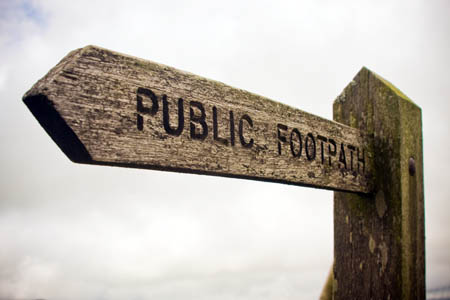Impending Government cuts could put the countryside out of bounds to walkers, according to the Ramblers.
The charity is predicting a return to the 1960s, with footpaths blocked and rights of way not maintained, if expected cuts to local authority budgets are imposed.
The coalition Government’s comprehensive spending review will be announced tomorrow and the Ramblers fear the cutbacks, of up to 40 per cent, will herald a return to the deplorable state of the country’s footpaths 50 years ago.
The organisation issued a top ten of walkers’ favourites that could be under threat, including Cumbria, North Yorkshire, the Peak District and Cornwall.
Ramblers’ chief executive Tom Franklin said: “In 2010 people feel confident that the footpaths they plan to follow will be open and easy to use. If we return to the forbidden Britain of the 1960s, with its pot-luck footpath network we will see a dramatic reduction in the number of people walking.
“This not only spells bad news for the economy, but a decline in walking will also put an unsustainable burden on the NHS.”
The Ramblers said £7.3bn was spent on visits to the countryside last year. But the charity said cuts to rights of way budgets will make walking in many popular destinations problematic and will adversely affect tourism – the last thing rural economies need in these troubling times.
The top ten at risk, according to the Ramblers, are:
- Cornwall, where cuts would set back the progress made in recent years, meaning that countryside walking in holiday destinations such as Newquay and Padstow becomes impossible. Even the jewel in the crown – the South West Coast Path – would be at risk.
- Somerset’s rights of way have already been subject to cuts in a recent restructure with the removal of agency agreements with district councils. Volunteers are ready to help, but further cuts could put walking in locations such as the Mendips at risk.
- In East Sussex walking in historic locations such as Hastings and Rye, and on routes such as the Wealdway, could be severely limited by any cuts to the council’s budget.
- In Shropshire, recent investment in the path network could prove to be wasted if cuts are made to the rights of way service now. Walking in places such as the Long Mynd and Stiperstones in the Shropshire Hills will be at risk.
- In Nottinghamshire budget proposals would see a 50 per cent cut in the number of rights of way staff. Walking in the Sherwood Forest will be at risk as a result.
- In the Derbyshire Peak District, the national park authority is seeking substantial savings. Problems caused on the hills around Castleton could remain unresolved, with materials and maintenance budgets slashed. Britain’s oldest national park could struggle to cope.
- In Lincolnshire, where the Ramblers successfully campaigned for investment in the path network in the early 2000s, any cuts would severely set back the work to improve access in the ‘County with the Big Sky’. Agri-business cares little for paths, and unless the council has staff able to take action, holiday locations such as Skegness and Sutton on Sea will find their paths unusable.
- North Yorkshire is the largest county in England. The Ramblers say it has fantastic landscapes and brilliant potential as a walking destination. But existing problems on the extensive path network will be magnified if the council cuts its budget. Access to walking options in Heriot country and Nidderdale would be severely limited.
- Unglamorous Bolton is probably not top of many people’s walking lists. But the countryside in this local authority is extensive, containing a dense network of paths and access onto Smithills Moor. Cuts proposed in this council will remove all the specialist rights of way staff – condemning the path network to neglect.
- Cumbria boasts the Lake District national park, where paths have traditionally been relatively open and easy to use, but the same has not always been true of the county’s path network outside the park. Cuts in Cumbria could put access around tourist locations such as Keswick and Wainwright’s Lakeland fells at risk.
